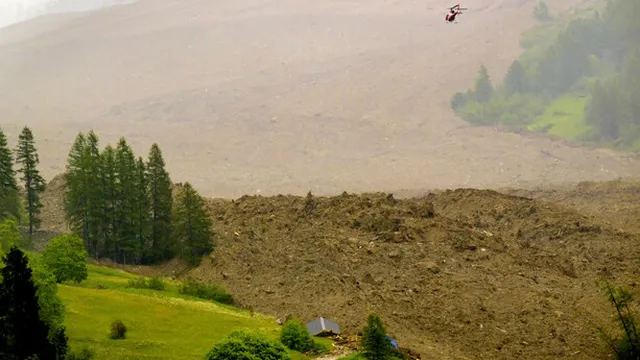
Man missing after glacier collapses in Swiss Alpine village
2025-05-29 13:46- A massive landslide caused by the collapse of the Birch Glacier occurred in Blatten, Switzerland, leading to significant destruction.
- Around 300 residents were evacuated prior to the event due to concerns regarding the glacier's stability and impending risks.
- Authorities are conducting search operations for a missing 64-year-old man, emphasizing the serious implications of climate change on glacier movements.
Express your sentiment!
Insights
Switzerland recently experienced a catastrophic event when a significant section of the Birch Glacier broke off, causing a devastating landslide in the Alpine village of Blatten in the southern Lötschental valley. This incident occurred just a day prior to Thursday, May 30, 2025, resulting in the disappearance of a 64-year-old man. As the glacier collapsed, it unleashed a torrent of mud and debris, which severely affected the village and partially submerged homes and buildings under thick layers of sludge. Authorities had previously evacuated approximately 300 residents and animals from the area due to rising dangers linked to the glacier's instability. The landslide sent plumes of dust high into the air and left nearly 90% of the village destroyed. State Councilor Stéphane Ganzer confirmed the extensive damage in statements made to Radio Télévision Suisse as the local emergency services mobilized effectively to conduct search and rescue operations using advanced technology, including drones equipped with thermal imaging cameras. The urgency of the situation stemmed from fears that large amounts of water could potentially accumulate in the buried Lonza River bed, raising concerns about possible flooding and further disasters. Recent discussions amongst Swiss glaciologists have highlighted the accelerating retreat of glaciers in the region, primarily attributed to climate change and global warming impacts. They have expressed apprehension over increased thawing rates of glaciers, with significant losses observed over recent years; 4% of the total glacier volume disappeared in 2023 alone, following a 6% decline the prior year. This alarming trend has fueled public discussions regarding environmental policies and the urgent need for measures to address the challenges posed by climate change. In light of this tragic event, the regional government has reaffirmed its commitment to ensure the safety of its residents and implement precautionary measures to mitigate the risks from potential further glacial movements. However, the situation remains precarious, and ongoing searches for the missing man are underway, with the community rallying in support of the affected individuals and families.
Contexts
Climate change poses a significant threat to the Swiss glaciers, which are crucial indicators of environmental shifts and serve as vital freshwater resources for the region. Since the late 19th century, Switzerland has experienced a marked decrease in its glacier mass, with fast-receding ice cover due to rising temperatures and shifting precipitation patterns. The average temperature in Switzerland has increased by approximately 2 degrees Celsius since the mid-20th century, contributing to accelerated melting rates. Glaciers in the Swiss Alps are now losing mass at an unprecedented rate, raising concerns about the long-term impacts on water supply, ecosystems, and related industries such as tourism and hydropower generation. The reduction in glacier mass affects not only the immediate landscape but also the broader ecological balance. Glacial meltwater typically feeds into rivers, playing an essential role in maintaining river flows, particularly during drier months. As glaciers shrink, the seasonal timing and volume of meltwater are altered, leading to potential water shortages for agriculture, drinking water, and industrial use. Additionally, a decrease in glacier volume compromises the ecosystems that rely on stable water sources, disrupting habitats and threatening biodiversity. Furthermore, the reliance on hydropower, which contributes significantly to Switzerland's energy supply, may be compromised as diminished glacial contributions lead to lower hydropower generation during critical summer months. Another pressing issue arising from glacier retreat relates to natural hazards. As glaciers retreat, they can destabilize surrounding terrain, leading to increased risks of rockfalls, landslides, and glacial lake outburst floods. These hazards pose threats not only to local ecosystems but also to human settlements. The infrastructure built around mountain regions, including roads, ski resorts, and hydroelectric facilities, may be at risk, prompting the need for assessment and possible intervention strategies to manage these risks effectively. Moreover, as the phenomenon of permafrost thawing escalates, it may further destabilize mountain slopes, compounding these already significant risks. Addressing the impacts of climate change on Swiss glaciers necessitates a multifaceted approach, incorporating research, policy-making, and community engagement. Increasing public awareness regarding the implications of glacier loss can foster greater acceptance of environmental initiatives aimed at climate mitigation. Investment in research to monitor glacier health and model future scenarios under various climate conditions is critical in informing policy decisions and resource management strategies. Furthermore, adaptive strategies that combine sustainable tourism practices with conservation efforts can help balance economic interests with the urgent need to protect these valuable natural resources. Ensuring the preservation of Swiss glaciers amidst a rapidly changing climate is essential for maintaining the region's ecological integrity, economic stability, and cultural heritage.